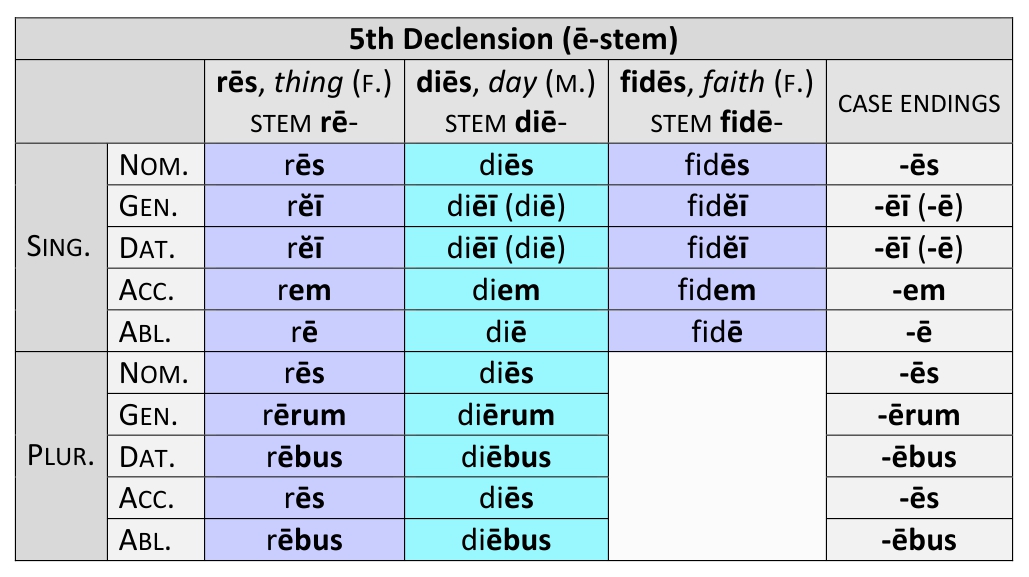NOUN DECLENSIONS
1ST DECLENSION: STEM, PARADIGM, AND GENDER
40. The Stem of nouns of the 1st declension ends in ā-. The nominative ending is -a (the stem-vowel shortened), except in Greek nouns.
41. Latin nouns of the 1st declension are thus declined:
a. The Latin has no article; hence stella may mean a star, the star, or simply star.
42. Nouns of the 1st declension are feminine, with the exception of nouns which are masculine from their signification (nauta, sailor). Similarly, a few family or personal names (Mūrēna, Dolābella, Scaevola;1 also, Hadria, the Adriatic).
Footnotes
1ST DECLENSION: CASE FORMS
43.a. The genitive singular anciently ended in -āī (dissyllabic), which is occasionally found, as in aulāī. The same ending sometimes occurs in the dative, but only as a diphthong.
b. An old genitive in -ās is preserved in the word familiās, often used in the combinations pater (māter, fīlius, fīlia) familiās, father, etc., of a family (plur. patrēs familiās or familiārum).
c. The locative form for the singular ends in -ae; for the plural in -īs (cf. § 80, footnote):
Rōmae at Rome
Athēnīs at Athens
d. The genitive plural is sometimes found in -um instead of -ārum, especially in Greek patronymics (Aeneadum, sons of Æneas), and in compounds with -cŏla and -gĕna, signifying dwelling and descent:
caelicolum celestials
Trōiugenum sons of Troy
So also in the Greek nouns amphora and drachma.
e. The dative and ablative plural of dea, goddess and fīlia, daughter, end in an older form -ābus (deābus, fīliābus) to distinguish them from the corresponding cases of deus, god, and fīlius, son (deīs, fīliīs). So rarely with other words,
līberta freed-woman
mūla she-mule
equa mare
But, except when the two sexes are mentioned together (as in formulas, documents, etc.), the form in -īs is preferred in all but dea and fīlia.
Note 1— The old ending of the Ablative singular (-ād) is sometimes retained in early Latin.
praidād booty (later, praedā)
Note 2— In the dative and ablative plural -eis for -īs is sometimes found, and -iīs (as in taeniīs) is occasionally contracted to -īs (taenīs); so regularly in words in -âia (Bâīs, from Bâiae).
1ST DECLENSION: GREEK NOUNS
44. Many nouns of the 1st declension borrowed from the Greek are entirely Latinized (aula court); but others retain traces of their Greek case-forms in the singular.
There are (besides proper names) about thirty-five of these words, several being names of plants or arts.
crambē cabbage
mūsicē music
Most have also regular Latin forms (comēta); but the Nominative sometimes has the a long.
a. Greek forms are found only in the singular; the plural, when it occurs, is regular (comētae, -ārum, etc.).
b. Many Greek nouns vary among the 1st, the 2nd, and the 3rd declensions.
Boōtae (genitive of Boōtēs, -is),
Thūcȳdidās (accusative plural of Thūcȳdidēs, -is).Note— The Greek accusative Scīpiadam (from Scīpiadēs, descendant of the Scipios) is found in Horace.
2ND DECLENSION: STEM, PARADIGM, AND GENDER
45. The Stem of nouns of the 2nd Declension ends in -ŏ.
viro- (stem vir man)
servo- (stem servus or
servos slave)
bello- (stem bellum war)
a. The nominative is formed from the stem by adding s in masculines and feminines, and m in neuters, the vowel ŏ being weakened to ŭ (see § 6.a and § 46. Note 1).
b. In most nouns whose stem ends in strong -rŏ- the s is not added in the Nominative, but o is lost, and e is added before r,1 if not already present.
ager, stem agrŏ-2
cf. puer, stem puero-
Exceptions: erus, hesperus, iūniperus, mōrus, numerus, taurus, umerus, uterus, vīrus, and many Greek nouns.
c. The stem vowel -ŏ has a variant form -ĕ,3 which is preserved in the Latin vocative singular of nouns in -us.
servĕ, vocative of servus slave
Note— In composition this -ĕ appears as -ĭ. Thus:
belli-ger warlike (from bello/e-, stem bellum war).
46. Nouns of the 2nd declension in -us (-os) and -um (-om) are thus declined.
Note 1 The earlier forms for nominative and accusative were -os, -om, and these were always retained after u- and v- up to the end of the Republic. The terminations -s and -m are sometimes omitted in inscriptions.
Cornēlio for Cornēlios, Cornēliom
Note 2— Stems in quo-, like equo-, change qu to c before u. Thus, ecus (earlier equos), equī, equō, ecum (earlier equom), eque. Modern editions disregard this principle.
47. Nouns of the 2nd declension in -er and -ir are thus declined.
Note— When e belongs to the stem, as in puer, it is retained throughout; otherwise it appears only in the nominative and vocative singular, as in ager.
48. Nouns ending in -us (-os), -er, -ir, are masculine; those ending in -um (-on) are neuter.
Exceptions: Names of countries and towns in -us (-os) are feminine.
Aegyptus, Corinthus
Also, many names of plants and gems, as well as:
alvus belly
carbasus linen [plural carbasa (n.) sails]
colus distaff
humus ground
vannus winnowing-shovel.
Many Greek nouns retain their original gender.
arctus (f.) the Polar Bear
methodus (f.) method
a. The following in -us are neuter; their Accusative (as with all neuters) is the same as the Nominative.
pelagus sea
vīrus poison
vulgus (rarely m.) the crowd
They are not found in the plural, except pelagus, which has a rare Nominative and Accusative plural pelagē.
Note— The nominative plural neuter cētē, sea monsters, occurs; the nominative singular cētus occurs in Vitruvius.
Footnotes
1. Compare the English chamber from French chambre.
2. Compare Greek ἀγρός, which shows the original o of the stem.
2ND DECLENSION: CASE FORMS
49.a. The locative form of this declension ends for the singular in -ī.
humī on the ground
Corinthī at Corinth
For the plural, in -īs.
Philippīs at Philippi (cf. § 80, footnote)
b. The genitive of nouns in -ius or -ium ended, until the Augustan Age, in a single -ī;
fīlī of a son
Pompêī of Pompey (Pompêius)
but the accent of the Nominative is retained.
ingĕ'nī of genius1
c. Proper names in -ius have -ī in the Vocative, retaining the accent of the Nominative.
Vergĭ'lī
So also, fīlius (son); genius (divine guardian).
Audī, mī fīlī. Hear, my son.
Adjectives in -ĭus form the Vocative in -ie, and some of these are occasionally used as nouns.
Lacedaemonie O Spartan
Note— Greek names in -īus have the vocative -īe.
Lyrcīus; voc. Lyrcīe
d. The genitive plural often has -um or (after v) -om (cf. § 6.a) instead of -ōrum, especially in the poets:
deum, superum, dīvom of the gods
virum of men
also in compounds of vir, and in many words of money, measure, and weight.
Sēvirum of the Seviri
nummum of coins
iūgerum of acres
e. The original ending of the Ablative singular (-ōd) is sometimes found in early Latin.
Gnaivōd (later, Gnaeō), Cneius
f. Proper names in -âius, êius, -ôius (as, Aurunculêius, Bôī), are declined like Pompêius.
g. Deus [(m.), god] is thus declined.
Note— The vocative singular of deus does not occur in classic Latin, but is said to have been dee; deus (like the nominative) occurs in the Vulgate. For the genitive plural, dīvum or dīvom, dīvus divine) is often used.
Footnotes
2ND DECLENSION: SPECIAL FORMS
50. The following stems in -ero-, in which e belongs to the stem, retain the e throughout and are declined like puer (§ 47).
| adulter adulterer | gener son-in-law | puer boy |
| socer father-in-law | vesper evening | Līber Bacchus |
Also, the adjective līber (free) of which līberī (children) is the plural (§ 111.a), and compounds in -fer and -ger (stem fero-, gero-).
lūcifer morning star
armiger squire
a. An old nominative socerus occurs. So vocative puere (boy) as if from †puerus (regularly puer).
b.Vir (man) has genitive virī; the adjective satur (sated) has saturī; vesper (evening) has ablative vespere (locative vesperī in the evening).
c. Mulciber (Vulcan) has -berī and -brī in the genitive. The names Hibēr and Celtibēr retain ē throughout.
51. The following, not having e in the stem, insert it in the nominative singular and are declined like ager (§ 47).
| ager field (stem agro-) | culter knife |
| aper boar | faber smith |
| arbiter judge | fiber beaver |
| auster south wind | liber book |
| cancer crab | magister master |
| caper goat | minister servant |
| coluber snake | oleaster wild olive |
| conger sea eel | onager (-grus) wild ass |
| scomber (-brus) mackerel | |
2ND DECLENSION: GREEK NOUNS
52. Greek nouns of the 2nd declension end in -os, -ōs, masculine or feminine, and in -on neuter.
They are mostly proper names and are declined as follows in the singular, the plural, when found, being regular.
a. Many names in -ēs belonging to the 3rd declension have also a genitive in -ī.
Thūcȳdidēs, Thūcȳdidī (compare § 44.b).
b. Several names in -er have also a nominative in -us.
Teucer or Teucrus
The name Panthūs has the vocative Panthū (§ 81.3).
c. The genitive plural of certain titles of books takes the Greek termination -ōn.
Geōrgicōn of the Georgics
d. The termination -oe (for Greek -οι) is sometimes found in the nominative plural.
Adelphoe the Adelphi (a play of Terence)
e. Greek names in -eus (like Orpheus) have forms of the 2nd and 3rd declensions (see § 82).
3RD DECLENSION: CLASSES
53. Nouns of the 3rd Declension end in a, e, ī, ō, y, c, l, n, r, s, t, x.
54. Stems of the 3rd Declension are classed as follows.
I. Consonant Stems
a. Mute stems
b. Liquid and Nasal stems
II. I-stems
a. Pure i-stems
b. Mixed i-stems
55. The Nominative is always derived from the stem. The variety in form in the Nominative is due to simple modifications of the stem, of which the most important are—
1. Combination of final consonants, as of c (or g) and s to form x.
dux, ducis, stem duc-
rēx, rēgis,
stem rēg-
2. Omission of a final consonant, as of a final nasal.
leō, leōnis, stem leōn-
ōrātiō, ōrātiōnis, stem ōrātiōn-
3. Omission of a final vowel, as of final i.
calcar, calcāris, stem calcāri-
4. Change of vowel in the final syllable, as of a to e.
prīnceps (for -caps), prīncipis, stem prīncip- (for -cap-)
3RD DECLENSION: MUTE STEMS, M. / F.
56. Masculine and feminine nouns with mute stems form the nominative by adding s to the stem.
A labial (p) is retained before s.
prīncep-s
A lingual (t, d) is dropped before s.
mīles (stem mīlit-)
cūstōs (stem cūstōd-)
A palatal (c, g) unites with s to form x.
dux (for † duc-s)
rēx (for † rēg-s)
In dissyllabic stems the final syllable often shows e in the Nominative and i in the stem.
prīnceps, stem prīncip- (for -cap-)
57. Nouns of this class are declined as follows.
a. In like manner are declined—
ariēs, -etis (m.) ram
comes, -itis (m. / f.) companion
lapis, -idis (m.) stone
iūdex, -icis (m.) judge
cornīx, -īcis (f.) raven
and many other nouns.
3RD DECLENSION: MUTE STEMS, N.
58. Most mute stems are masculine or feminine. Those that are neuter have for the nominative the simple stem. But—
a. Lingual Stems (t, d) ending in two consonants drop the final mute.
cor (stem cord-)
lac (stem lact-)
So also stems in ăt- from the Greek.
poēma (stem poēmat-)
b. The stem capit- shows u in the nominative (caput for †capot).
59. Nouns of this class are declined as follows.
60. The following irregularities require notice.
a. Greek neuters with nominative singular in -a (as poēma) frequently end in -īs in the dative and ablative plural, and rarely in
-ōrum in the genitive plural.
poēmatīs (for poēmatibus), poēmatōrum (for poēmatum)
b. A number of monosyllabic nouns with mute stems lack the genitive plural (like cor). See § 103.g.2.
3RD DECLENSION: LIQUID AND NASAL STEMS, M. / F.
61. In masculine and feminine nouns with liquid and nasal stems the nominative is the same as the stem.
Exceptions are the following:
1. Stems in ōn- drop n in the nominative.
legiō, stem legiōn-
2. Stems in din- and gin- drop n and keep an original ō in the nominative.
virgō, stem virgin-1
3. Stems in in- (not din- or gin-) retain n and have e instead of i in the nominative.
cornicen, stem cornicin-1
4. Stems in tr- have -ter in the nominative.
pater, stem patr-2
62. Nouns of this class are declined as follows.
Note 1— Stems in ll-, rr- (n.) lose one of their liquids in the nominative.
far, farris
mel, mellis
Note 2— A few masculine and feminine stems have a nominative in -s as well as in -r.
honōs or honor
arbōs or arbor
Note 3— Canis, dog, and iuvenis, youth, have -is in the nominative.
Footnotes
2. These, no doubt, had originally ter- in the stem, but this had become weakened to tr- in some of the cases even in the parent speech. In Latin only the nominative and vocative singular show the e. But cf. Māspitris and Māspiteris (Mā[r]s-piter), quoted by Priscian as old forms.
3RD DECLENSION: LIQUID AND NASAL STEMS, N.
63. In neuter nouns with liquid or nasal stems the nominative is the same as the stem.
Exceptions:
- Stems in in- have e instead of i in the nominative, as in nōmen (stem nōmin-).
- Most stems in er- and or- have -us in the nominative.
genus, stem gener-1
64. Nouns of this class are declined as follows.
So also are declined
opus, -eris work
pīgnus, -eris or
-oris pledge, etc.
Note— The following real or apparent liquid and nasal stems have the Genitive plural in -ium, and are to be classed with the i-stems:
imber, linter, ūter, venter; glīs, mās, mūs, [† rēn]
Also vīrēs (plural of vīs: see § 79).
Footnotes
3RD DECLENSION: I-STEMS
65. Nouns of this class include—
- Pure i-stems:
a. Masculine and feminine parisyllabic 1 nouns in -is and four in -er.
b. Neuters in -e, -al, and -ar.
- Mixed i-stems, declined in the singular like consonant stems, the plural like i-stems.
Footnotes
3RD DECLENSION: PURE I-STEMS, M. / F.
66. Masculine and feminine parisyllabic nouns in -is form the nominative singular by adding s to the stem. Four stems in bri- and tri- do not add s to form the nominative, but drop i and insert e before r . These are imber, linter, ūter, venter.
67. Nouns of this class are declined as follows.
3RD DECLENSION: PURE I-STEM, N.
68. In neuters the nominative is the same as the stem, with final i changed to e (mare, stem mari-). But most nouns1 in which the i of the stem is preceded by -āl- or -ār- lose the final vowel and shorten the preceding ā.
animăl, stem animāli-2
a. Neuters in -e, -al, and -ar have -ī in the ablative singular, -ium in the genitive plural, and -ia in the nominative and accusative plural.
animal, animālī, -ia, -ium
69. Nouns of this class are declined as follows.
Footnotes
2.Exceptions are augurāle, collāre, fōcāle, nāvāle, penetrāle, rāmāle, scūtāle, tībiāle; alveāre, capillāre. cochleāre.
3RD DECLENSION: MIXED I-STEM
70. Mixed i-stems are either original i-stems that have lost their i- forms in the singular, or consonant stems that have assumed i- forms in the plural.
Note— It is sometimes impossible to distinguish between these two classes.
71. Mixed i-stems have -em in the accusative and -e in the ablative singular, -ium in the genitive,1 and -īs or -ēs in the accusative plural. They include the following:
- Nouns in -ēs, genitive -is.2
- Monosyllables in -s or -x preceded by a consonant.
ars, pōns, arx
- Polysyllables in -ns or -rs.
cliēns, cohors
- Nouns in -tās, genitive -tātis (gen. plural usually -um.3
cīvitās
- Penātēs, optimātēs, and nouns denoting birth or abode (patrials) in -ās, -īs, plural -ātēs, -ītēs.
Arpīnās, plural Arpīnātēs
Quirīs, plural Quirītēs - The following monosyllables in -s or -x preceded by a vowel.
dōs, fraus, glīs, līs, mās, mūs, nix, nox, strix, vīs
72. Nouns of this class are thus declined:
Footnotes
2.These are acīnacēs, aedēs, alcēs, caedēs, cautēs, clādēs, compāgēs , contāgēs, famēs, fēlēs, fidēs (pl.), indolēs, lābēs, luēs, mēlēs, mōlēs, nūbēs, palumbēs, prōlēs, prōpāgēs, pūbēs, sēdēs, saepēs, sordēs, strāgēs, struēs, subolēs, tābēs, torquēs, tudēs, vātēs, vehēs, veprēs, verrēs, vulpēs; aedēs has also nominative aedis.
3.There is much variety in the practice of the ancients, some of these words having -ium, some -um, and some both.
3RD DECLENSION: SUMMARY OF I-STEM FORMS
73. The i-declension was confused even to the Romans themselves, nor was it stable at all periods of the language, early Latin having i-forms which afterwards disappeared. There was a tendency in nouns to lose the i-forms, in adjectives to gain them. The nominative plural (-īs)1 was most thoroughly lost, next the accusative singular (-im), next the ablative (-ī); while the genitive and accusative plural (-ium, -īs) were retained in almost all.
74. I-stems show the i of the stem in the following forms:
a. They have the genitive plural in -ium (but some monosyllables lack it entirely). For a few exceptions, see § 78 below.
b. All neuters have the nominative and accusative plural in -ia.
c. The accusative plural (m. or f.) is regularly -īs.
d. The accusative singular (m. or f.) of a few ends in -im (§ 75 below).
e. The ablative singular of all neuters, and of many masculines and feminines, ends in -ī.
75. The regular case-ending of the accusative singular of i-stems (m. or f.) would be -im.
sitis, sitim (cf. stella, -am; servus, -um)
But, in most nouns this is changed to -em (following the consonant declension).
a. The accusative in -im is found exclusively—
1. In Greek nouns and in names of rivers.
2. In būris, cucumis,
rāvis, sitis, tussis,
vīs.
3. In adverbs in -tim (being accusative of nouns in
-tis), as, partim; and in amussim.
b. The accusative in -im is found sometimes in febris, puppis, restis, turris, secūris, sēmentis, and rarely in many other words.
76. The regular form of the ablative singular of i-stems would be -ī.
sitis, sitī
But, in most nouns this is changed to -e.
a. The Ablative in -ī is found exclusively—
1. In nouns having the Accusative in -im (§ 75 above); also secūris.
2. In the following adjectives used as nouns.
aequālis, annālis, aquālis, cōnsulāris, gentīlis, molāris, prīmipīlāris, tribūlis
3. In neuters in -e, -al, -ar except: baccar, iubar, rēte, and sometimes mare.
b. The Ablative in -ī is found sometimes—
1. In avis, clāvis, febris, fīnis, īgnis,1 imber, lūx, nāvis, ovis, pelvis, puppis, sēmentis, strigilis,
turris, and occasionally in other words.
2. In the following adjectives used as nouns.
affīnis, bipennis, canālis, familiāris, nātālis, rīvālis, sapiēns, tridēns, trirēmis, vōcālis
Note 1— The ablative of famēs is always famē (§ 105.e). The defective māne has sometimes mānī (§ 103.b Note) as ablative.
Note 2— Most names of towns in -e (as, Praeneste, Tergeste) and Sōracte, a mountain, have the ablative in -e. Caere has Caerēte.
Note 3— Canis and iuvenis have cane, iuvene.
77. The regular nominative plural of i-stems is -ēs,1 but -īs is occasionally found. The regular accusative plural -īs is common, but not exclusively used in any word. An old form for both cases is -eis (diphthong).
78. The following have -um (not -ium) in the genitive plural.
- Always— canis, iuvenis,2 ambāgēs, mare (once only, otherwise wanting), volucris.
- Regularly— sēdēs, vātēs
- Sometimes— apis, caedēs, clādēs, mēnsis, struēs, subolēs
- Very rarely— patrials in -ās, -ātis; -īs, -ītis.
Arpīnās, Arpīnātum, Samnīs, Samnītum
Footnotes
2.Canis and iuvenis are really n-stems
3RD DECLENSION: IRREGULAR NOUNS
79. In many nouns the stem is irregularly modified in the nominative or other cases. Some peculiar forms are thus declined.
a. Two vowel-stems in ū-, grū- and sū-, which follow the 3rd declension, add s in the nominative, and are inflected like mute stems: grūs has also a nominative gruis, sūs has both suibus and sū̆bus, grūs has only gruibus.
b. In the stem bov- (bou-) the diphthong ou becomes ō in the nominative (bōs, bŏvi). In nāv- (nau-) an i is added (nāvis, -is), and it is declined like turris (§ 67). In Iŏv- (= Ζεύς) the diphthong (ou) becomes ū in Iū-piter (for -păter), genitive Iŏvis, etc.; but the form Iuppiter is preferred.
c. In iter, itineris (n.), iecur, iecinoris (iecoris) (n.), supellēx, supellēctilis (f.), the nominative has been formed from a shorter stem; in senex, senis, from a longer; so that these words show a combination of forms from two distinct stems.
d. In nix, nivis the nominative retains a g from the original stem, the g uniting with s, the nominative ending, to form x. In the other cases the stem assumes the form niv- and it adds i in the genitive plural.
e. Vās (n.), vāsis, keeps s throughout; plural vās, vāsōrum. A dative plural vāsibus also occurs. There is a rare singular vāsum.
3RD DECLENSION: LOCATIVE CASE
80. The Locative form for nouns of the 3rd declension ends in the singular in -ī or -ē, in the plural in -ibus.
rūrī in the country
Carthāginī or Carthāgine at Carthage
Trallibus at Tralles1
Footnotes
3RD DECLENSION: GREEK NOUNS
81. Many nouns originally Greek—mostly proper names—retain Greek forms of inflection. So especially:
- Genitive singular in -o, as, tigridos.
- Accusative singular in -a, as, aethera.
- Vocative singular like the stem, as, Periclē, Orpheu, Atlā.
- Nominative plural in -ĕs, as, hērōĕs.
- Accusative plural in -ăs, as, hērōăs.
82. Some of these forms are seen in the following examples.
Note— The regular Latin forms may be used for most of the above.
83. Other peculiarities are the following.
a. Delphīnus, -ī (m.), has also the form delphīn, -īnis; Salamīs, -is (f.) has acc. Salamīna.
b. Most stems in ĭd- (nom. -is) often have also the forms of i-stems.
tigris, gen. -ĭdis (-ĭdos) or -is; acc. -ĭdem (-ĭda) or -im (-in); abl. -ĭde or -ī
But many, including most feminine proper names, have acc. -idem
(-ida); abl. -ide, not -im or -ī. (These stems are irregular also in Greek.)
c. Stems in on- sometimes retain -n in the nominative.
Agamemnōn (or Agamemnō), gen. -ŏnis, acc. -ŏna
d. Stems in ont- form the nominative in -ōn (horizōn, Xenophōn). But a few are occasionally Latinized into ōn- (nom. -ō).
Dracō, -ōnis
Antiphō, -ōnis
e. Like Simoīs are declined stems in ant-, ent-, and a few in ūnt- (nominative in -ās, -īs, -ūs).
Atlās, -antis
Trapezūs, -ūntis
f. Some words fluctuate between different declensions, as Orpheus between the 2nd and the 3rd.
g. -ōn is found in the Genitive plural in a few Greek titles of books.
Metamorphōseōn of the Metamorphoses (Ovid's poem)
Geōrgicōn of the Georgics (a poem of Virgil)
3RD DECLENSION: GENDER
84. The Gender of nouns of this declension must be learned by practice and from the Lexicon. Many are masculine or feminine by nature or in accordance with the general rules for gender (§ 31). The most important rules for the others, with their principal exceptions, are the following.1
85. Nouns in -or, -ōs, -er, -ĕs (gen. -itis), -ex (gen. -ĭcis) are masculine.
color, flōs, imber, gurges (gurgitis), vertex (verticis).
Exceptions:
a. The following are feminine.
Arbor, cōs, dōs, linte
b. The following are neuter:
Ador, aequor, cor, marmor, ōs (ōris)
also,
os (ossis), cadāver, iter, tūber, ūber, vēr
and names of plants and trees in -er.
acer, papāver
86. Nouns in -ō, -ās, -ēs, -is, -ūs, -x, and in -s preceded by a consonant are feminine.
legiō, cīvitās, nūbēs, avis, virtūs, arx, urbs
The nouns in -ō are mostly those in -dō and -gō, and abstract and collective nouns in -iō.
Exceptions:
a. The following are masculine:
leō, leōnis
ligō, -ōnis
sermō, -ōnisa
also,
cardō, harpagō, margō, ōrdō, turbō
and concrete nouns in -iō.
pugiō, ūniō, papiliō2
In addition,
acīnacēs, ariēs, celēs, lebēs, pariēs, pēs
nouns in -nis and -guis:
īgnis, sanguis
and
axis, caulis, collis, cucumis, ēnsis, fascis, follis, fūstis, lapis, mēnsis, orbis, piscis, postis, pulvis, vōmis.
Mūs is masculine, as are:
calix, fornix, grex, phoenīx
and nouns in -ex (gen. -icis) (see § 85 above).
Finally,
dēns, fōns, mōns, pōns.
Note— Some nouns in -is and -ns which are masculine were originally adjectives or participles agreeing with a masculine noun.
Aprīlis [sc. mēnsis]
(m.) April
oriēns [sc. sōl] (m.) the east
annālis [sc. liber] (m.) the year-book
b. The following are neuter.
vās (vāsis)
crūs, iūs, pūs, rūs, tūs
87. Nouns in -a, -e, -l, -n, -ar, -ur, -ŭs are neuter.
poēma, mare, animal, nōmen, calcar, rōbur, corpus
Also lac and caput.
Exceptions:
a. The following are masculine.
sāl, sōl, pecten, vultur, lepus
b. The following is feminine.
pecus (gen. -udis)
Footnotes
2. Many nouns in -ō (gen. -ōnis) are masculine by signification.
gerō carrier
restiō
ropemaker
And family names (originally nicknames).
4TH DECLENSION: STEM, PARADIGM, AND GENDER
88. The Stem of nouns of the 4th Declension end in u-. This is usually weakened to i before -bus. Masculine and feminine nouns form the nominative by adding s; Neuters have for nominative the simple stem, but with ū (long).
89. Nouns of the Fourth Declension are declined as follows.
90. Most nouns of the 4th Declension in -us are masculine.
Exceptions:
The following are feminine:
acus, anus, colus, domus, īdūs (plural), manus, nurus, porticus, quīnquātrūs (plural), socrus, tribus
with a few names of plants and trees. Also, rarely, penus, specus.
91. The only neuters of the 4th Declension are:
cornū, genū, pecū (see § 105.f), verū1
Footnotes
4TH DECLENSION: CASE FORMS
92. The following peculiarities in case forms of the 4th Declension require notice.
a. A genitive singular in -ī (as of the 2nd declension) sometimes occurs in nouns in -tus.
senātus, gen. senātī (regularly senātūs)
b. In the genitive plural -uum is sometimes pronounced as one syllable, and may then be written -um.
currum (Aen. 6.653) for curruum
c. The dative and ablative plural in -ŭbus are retained in partus and tribes, regularly in artus and lacus, and occasionally in other words; portus and specus have both -ubus and -ibus.
d. Most names of plants and trees, and colus (distaff) also have 2nd declension forms.
fīcus fig, gen. fīcūs or fīcī
e. An old genitive singular in -uis or -uos and an old Genitive plural in -uom occur rarely.
senātuis, senātuos
fluctuom
f. The ablative singular ended anciently in -ūd (cf. § 43, Note 1): magistrātūd.
93. Domus [(f.) house] has two stems ending in u- and o-. Hence it shows forms of both the 4th and 2nd declensions.
Note 1— The Locative is domī (rarely domuī) at home.
Note 2— The Genitive domī occurs in Plautus; domōrum is late or poetic.
4TH DECLENSION: NOUNS
94. Most nouns of the 4th Declension are formed from verb-stems, or roots, by means of the suffix -tus (-sus) (§ 238.b).
cantus song; CAN, canō sing
cāsus (for †cad-tus) chance; CAD, cadō fall
exsulātus exile; from exsulō to be an exile (exsul)
a. Many are formed either from verb stems not in use, or by analogy.
cōnsulātus (as if from †cōnsulō, -āre), senātus, incestus
b. The accusative and the dative or ablative of nouns in -tus (-sus)form the Supines of verbs (§ 159.b).
spectātum, petītum; dictū, vīsū
c. Of many verbal derivatives only the ablative is used as a noun;
iussū (meō) by (my) command
iniussū (populī) without (the people's) order
of some only the dative is used.
dīvīsuī
5TH DECLENSION: STEM, PARADIGM, and GENDER
95. The Stem of nouns of the 5th Declension ends in ē-, which appears in all the cases. The Nominative is formed from the stem by adding s.
96. Nouns of the 5th Declension are declined as follows.
Note— The ē of the stem is shortened in the genitive and dative singular of fidēs, spēs, rēs, but in these it is found long in early Latin. In the accusative singular e is always short.
97. All nouns of the 5th Declension are feminine, except diēs (usually m.) day, and merīdiēs (m.) noon.
a. Diēs is sometimes feminine in the singular, especially in phrases indicating a fixed time, and regularly feminine when used of time in general.
cōnstitūtā diē on a set day
longa diēs a long time
5TH DECLENSION: CASE FORMS
98. The following peculiarities require notice:
a. Of nouns of the 5th declension, only diēs and rēs are declined throughout. Most lack the plural, which is, however, found in the nominative or accusative in aciēs, effigiēs, ēluviēs, faciēs, glaciēs, seriēs, speciēs, spēs.1
b. The Locative form of this declension ends in -ē. It is found only in certain adverbs and expressions of time.
| hodiē today | diē quārtō (old, quārtī) the 4th day |
| perendiē day after tomorrow | prīdiē the day before |
c.The 5th declension is closely related to the 1st, and several nouns have forms of both.
māteria, -iēs
saevitia, -iēs
The genitive and dative in -ēī are rarely found in these words.
d. Some nouns vary between the 5th and the 3rd declension.
equiēs
satiēs (also satiās, gen. -ātis)
plēbēs (also plēbs, gen. plēbis)
famēs (gen. famis, abl. famē)
Note— In the genitive and dative -ēī (-ĕī) was sometimes contracted into -ei.
tribūnus plēbei tribune of the people (plēbēs)
Genitives in -ī and -ē also occur.
diī (Aen. 1.636)
plēbī-scītum
aciē (B. G.
2.23)
A few examples of the old genitive in -ēs are found (cf. -ās in the first declension, § 43.b). The dative has rarely -ē, and a form in -ī is cited.
Footnotes
NOUNS LACKING THE PLURAL
99. Some nouns are ordinarily found in the singular only (singulāria tantum). These are—
- Most proper names.
Caesar Cæsar
Gallia Gaul - Names of things not counted, but reckoned in mass.
aurum gold
āēr air
trīticum wheat - Abstract nouns.
ambitiō ambition
fortitūdō courage
calor heat
100. Many of these nouns, however, are used in the plural in some other sense.
a. The plural of a proper name may be applied to two or more persons, places, or things, and so become strictly common.
duodecim Caesarēs the twelve Cæsars
Galliae the two Gauls (Cis- and Transalpine)
Castores Castor and Pollux
Iovēs images of Jupiter
b. The plural forms of names of things reckoned in mass may denote particular objects.
aera bronze utensils
nivēs snowflakes
Alternatively, the plural may denote different kinds of a thing.
āerēs airs (good and bad)
c. The plural of abstract nouns denotes occasions or instances of the quality, or the like.
quaedam excellentiae some cases of superiority
ōtia periods of rest
calōrēs,
frīgora times of heat or cold
NOUNS LACKING THE SINGULAR
101. Some nouns are commonly or exclusively found in the Plural (plūrālia tantum). Such are—
1. Many names of towns.
Athēnae (Athens)
Thūriī
Philippī
Vêiī
2. Names of festivals and games.
Olympia the Olympic Games
Bacchānālia feast of Bacchus
Quīnquātrūs festival of Minerva
lūdī
Rōmānī the Roman Games
3. Names of classes.
optimātēs the upper classes
mâiōrēs ancestors
līberī children
penātēs household gods
Quirītēs citizens (of Rome)
4. Words plural by signification.
arma weapons
artūs joints
dīvitiae riches
scālae stairs
valvae folding-doors
forēs double-doors
angustiae a narrow pass
(narrows)
moenia city
walls
Note 1— Some words, plural by signification in Latin, are translated by English nouns in the singular number.
dēliciae delight, darling
faucēs throat
fidēs lyre (also singular in poetry)
īnsidiae ambush
cervīcēs neck
viscera flesh
Note 2— The poets often use the plural number for the singular, sometimes for metrical reasons, sometimes from a mere fashion.
ōra (for ōs) the face
scēptra (for scēptrum) sceptre
silentia (for silentium) silence
102. Some nouns of the above classes (§ 101.1-4 above), have a corresponding singular, as noun or adjective, often in a special sense:
- As noun, to denote a single object.
Bacchānal a spot sacred to Bacchus
optimās an aristocrat - As adjective: Catō Mâior (Cato the Elder).
- In a sense rare, or found only in early Latin.
scāla a ladder
valva a door
artus a joint
NOUNS DEFECTIVE IN CASES
103. Many nouns are defective in case-forms.1
a. Indeclinable nouns, used only as nominative and accusative singular.
fās, nefās, īnstar, nihil, opus (need), secus
Note 1— The indeclinable adjective necesse is used as a nominative or accusative.
Note 2— The genitive nihilī and the ablative nihilō (from nihilum nothing) occur.
b. Nouns found in one case only (monoptotes):
- In the nominative singular.
glōs (f.)
- In the genitive singular.
dicis
naucī (n.) - In the dative singular.
dīvīsuī (m.) (cf. § 94.c)
- In the accusative singular.
amussim (m.)
vēnum (Dative vēnō in Tacitus) - In the ablative singular
pondō (n.)
māne (n.)
astū (m.) [by craft]
iussū, iniussū
nātūand many other verbal nouns in -us (§ 94.c).
Note— Māne is also used as an indeclinable accusative, and an old form mānī is used as ablative. Pondō with a numeral is often apparently equivalent to pounds. A nominative singular astus and a plural astūs occur rarely in later writers.
- In the accusative plural: īnfitiās.
c. Nouns found in two cases only (diptotes):
- In the nominative and ablative singular.
for, forte (f.)
- In the genitive and ablative singular.
spontis (rare), sponte (f.)
- In the accusative singular and plural.
dicam, dicās (f.)
- In the accusative and ablative plural.
forās, forīs (f.) (cf. forēs), used as adverbs.
d. Nouns found in three cases only (triptotes):
- In the nominative, accusative, and ablative singular.
impetus, -um, -ū (m.)2
luēs, -em, -ē (f.) - In the nominative, accusative, and dative or ablative plural.
grātēs, -ibus (f).
- In the nominative, genitive, and dative or ablative plural.
iūgera, -um, -ibus (n.); iūgerum, etc., in the singular (cf. § 105.b)
e. Nouns found in four cases only (tetraptotes): the genitive, dative, accusative, and ablative singular.
diciōnis , -ī, -em, -e (f.)
f. Nouns declined regularly in the plural, but defective in the singular:
- Nouns found in the singular, in genitive, dative, accusative, ablative.
frūgis, -ī, -em, -e (f.)
opis, -ī (once only), -em, -e [nominative Ops (f.) as a divinity] - Nouns found in the dative, accusative, ablative.
precī, -em, -e (f.)
- Nouns found in the accusative and ablative.
cassem, -e (f.)
sordem, -e (f.) - Nouns found in the ablative only.
ambāge (f.)
face (f.)
obice (m. / f.).
g. Nouns regular in the singular, defective in the plural.
- The following neuters have in the plural the nominative and accusative only.
fel (fella)
far (farra)
hordeum (hordea)
iūs broth (iūra)
mel (mella)
murmur (murmura)
pūs (pūra)
rūs (rūra)
tūs or thūs (tūra)Note— The neuter iūs (right) has only iūra in classical writers, but a very rare genitive plural iūrum occurs in old Latin.
- calx, cor, cōs, crux, fax, flex, lane, lūx, nex, ōs (ōris),3 os (ossis),4 pāx, pix, rōs, sāl, sōl, vas (vadis), lack the genitive plural.
- Most nouns of the 5th declension lack the whole or part of the plural (see § 98.a).
h. Nouns defective in both singular and plural:
- Noun found in the genitive, accusative, ablative singular; nominative, accusative, dative, ablative plural.
vicis, -em, -e; -ēs, -ibus
- Noun found in the genitive, dative, accusative, and ablative singular; lacking the genitive plural.
dapis, -ī, -em, -e; -ēs, -ibus5
Footnotes
2. The dative singular impetuī and the ablative plural impetibus occur once each.
3. The ablative plural ōribus is rare, the classical idiom being in ōre omnium (in everybody's mouth) etc., not in ōribus omnium.
4. The genitive plural ossium is late; ossuum (from ossua, plural of a neuter u- stem) is early and late.
5. An old nominative daps is cited.
VARIABLE NOUNS
104. Many nouns vary either in Declension or in Gender.
105. Nouns that vary in Declension are called heteroclites.1
a. Colus (f.), distaff; domus (f.), house (see § 93), and many names of plants in -u, vary between the 2nd and 4th Declensions.
b. Some nouns vary between the 2nd and 3rd:
iūgerum, -ī, -ō, abl. -ō or -e, plural -a, -um, -ibus
Mulciber, gen. -berī and -beris
sequester, gen. -trī and
-tris
vās, vāsis,
and (old) vāsum, -ī (§79.e).
c. Some vary between the 2nd, 3rd, and 4th.
penus, penum, gen. penī and penoris, abl. penū.
d. Many nouns vary between the 1st and 5th (see § 98.c).
e. Some vary between the 3rd and 5th.
requiēs, gen. -ētis, dat. — , acc. -ētem or -em, abl. -ē (once
-ēte)
famēs, regularly of the 3rd declension,
abl. famē (§ 76, Note 1)
pūbēs (m.) has once dat. pūbē (in Plautus).
f. Pecus varies between the 3rd and 4th, having pecoris, etc., but also nom. pecū, abl. pecū; plural pecua, gen. pecuum.
g. Many vary between different stems of the same declension:
femur (n.), gen. -oris, also -inis (as from † femen)
incur (n.),
gen. iecinoris, iocinoris, iecoris
mūnus (n.), plural mūnera and
mūnia.
106. Nouns that vary in Gender are said to be heterogeneous.2
a. The following have a masculine form in -us and a neuter in -um:
balteus, cāseus, clipeus, collum, cingulum, pīleus, tergum, vāllum
with many others of rare occurrence.
b. The following have in the plural a different gender from that of the singular:
| balneum (n.) bath | balneae (f.) baths (an establishment) |
| caelum (n.) heaven | caelōs [(m.) acc., Lucretius] |
| carbasus (f.) a sail | carbasa, -ōrum (n.) sails |
| dēlicium (n.) pleasure | dēliciae (f.) pet |
| epulum (n.) feast | epulae (f.) feast |
| frēnum (n.) a bit | frēnī (m.) or frēna (n.) a bridle |
| iocus (m.) a jest | ioca (n.), iocī (m.) jests |
| locus (m.) place |
loca (n.), locī (m.) usually topics, |
| rāstrum (n.) a rake | rāstrī (m.), rāstra (n.) rakes |
Note— Some of these nouns are heteroclites as well as heterogeneous.
107. Many nouns are found in the Plural in a peculiar sense:
| aedēs, -is (f.) temple | aedēs, -ium house |
| aqua (f.) water |
aquae mineral springs, |
| auxilium (n.) help | auxilia auxiliaries |
| bonum (n.) a good | bona goods, property |
| carcer (m.) dungeon | carcerēs barriers (of race-course) |
| castrum (n.) fort | castra camp |
| comitium (n.) place of assembly |
comitia an election, |
| cōpia (f.) plenty | cōpiae stores, troops |
| fidēs (f.) harp-string | fidēs lyre |
| fīnis (m.) end | fīnēs bounds, territories |
| fortūna (f.) fortune | fortūnae possessions |
|
grātia (f.) favor |
grātiae thanks |
| hortus (m.) a garden | hortī pleasure-grounds |
| impedīmentum (n.) hindrance | impedīmenta baggage |
| littera (f.) letter (of alphabet) | litterae epistle, literature |
| locus (m.) place [pl. loca (n.)] | locī3 topics, places in books |
| lūdus sport | lūdī public games |
| mōs (m.) habit, custom | mōrēs character |
| nātālis (m.) birthday | nātālēs descent, origin |
| opera (f.) work | operae day-laborers (“hands”) |
| [ops] opis (f.) help (§ 103.f.1) | opēs resources, wealth |
| pars (f.) part | partēs part (on the stage), party |
| rōstrum (n.) beak of a ship | rōstra speaker's platform |
| sāl (m. / n.) salt | salēs witticisms |
| tabella (f.) tablet | tabellae documents, records |
Footnotes
NAMES OF PERSONS
108. A Roman had regularly three names (1) the praenōmen, or personal name; (2) the nōmen, or name of the gēns or house; (3) the cōgnōmen, or family name:
Thus in Mārcus Tullius Cicerō we have—
- Mārcus, the praenōmen, like our Christian or given name.
- Tullius, the nōmen, properly an adjective denoting of the Tullian gēns (or house ) whose original head was a real or supposed Tullus.
- Cicerō, the cōgnōmen, or family name, often in origin a nickname, in this case from cicer, a vetch, or small pea.
Note— When two persons of the same family are mentioned together, the cōgnōmen is usually put in the plural: Pūblius et Servius Sullae.
a. A fourth or fifth name was sometimes given as a mark of honor or distinction, or to show adoption from another gēns.
Thus the complete name of Scipio the Younger was Pūblius Cornēlius Scīpiō Āfricānus Aemiliānus: Āfricānus, from his exploits in Africa; Aemiliānus, as adopted from the Æmilian gēns.1
Note— The Romans of the classical period had no separate name for these additions, but later grammarians invented the word āgnōmen to express them.
b. Women had commonly in classical times no personal names, but were known only by the nōmen of their gēns.
Thus, the wife of Cicero was Terentia, and his daughter Tullia. A second daughter would have been called Tullia secunda or minor, a third daughter, Tullia tertia, and so on.
c. The commonest prænomens are thus abbreviated:
| A.— Aulus | L.— Lūcius | Q.— Quīntus |
| App. (Ap.)— Appius | M.— Mārcus | Ser.— Servius |
| C. (G.)—
Gāius (Caius) [cf. § 1.a] |
M'.— Mānius | Sex. (S.)— Sextus |
| Cn. (Gn.)— Gnaeus (Cneius) | Mām.— Māmercus | Sp.— Spurius |
| D.— Decimus | N. (Num.)— Numerius | T.— Titus |
| K.— Kaesō (Caeso) | P.— Pūblius | Ti. (Tib.)— Tiberius |
Note— In the abbreviations C. and Cn., the initial character has the value of G (§ 1.a).
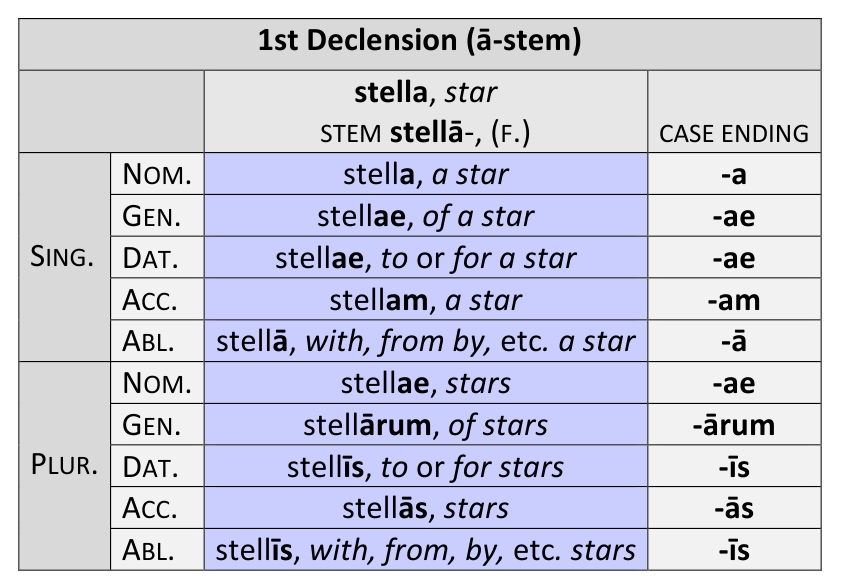
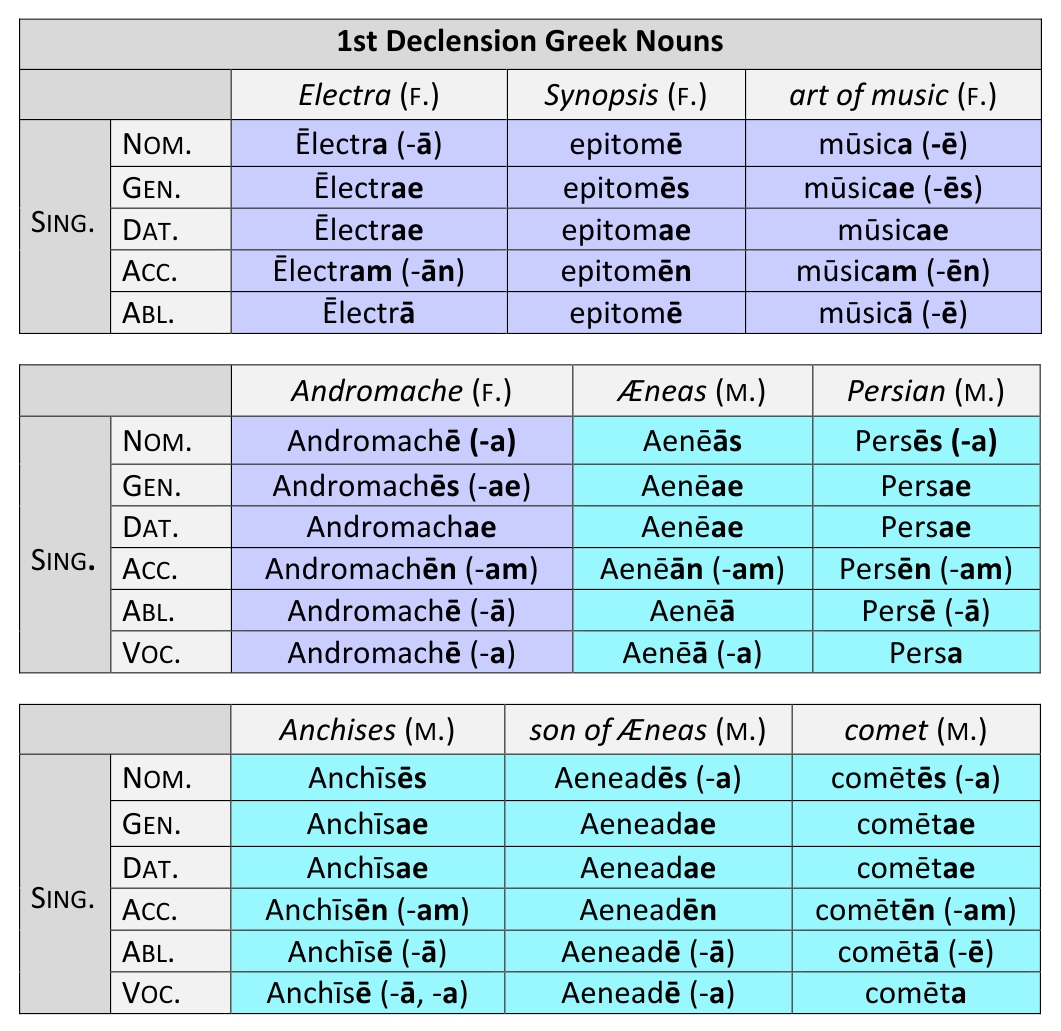
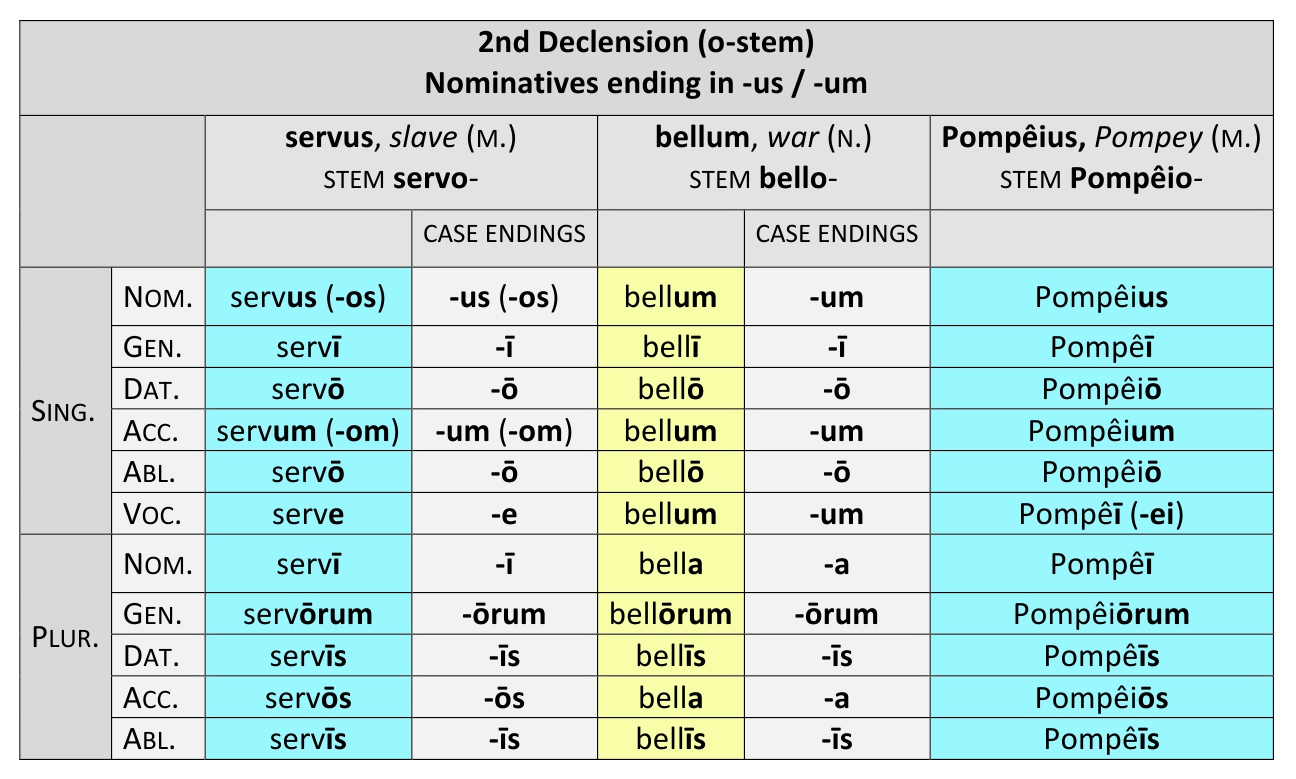
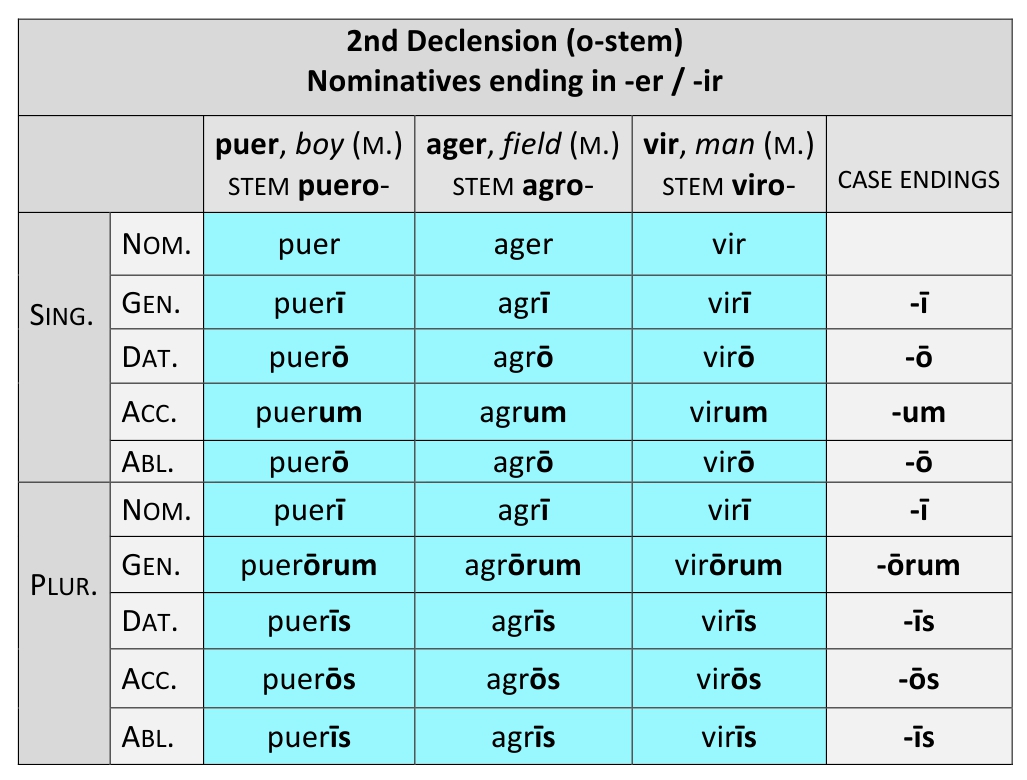
![Declension of masculine noun Deus [god]](files/noun-declensions/deus_decl_1.jpg)

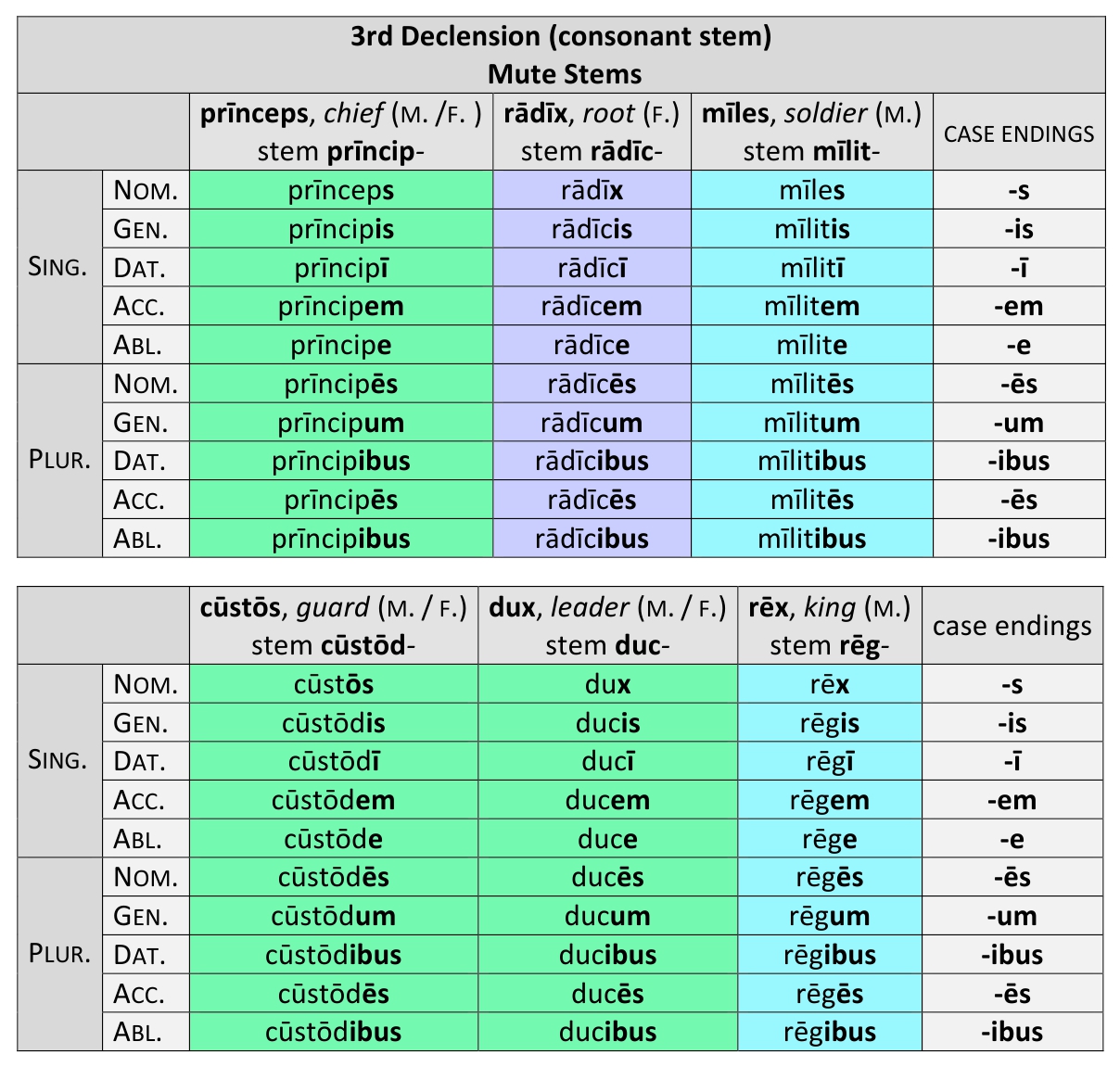
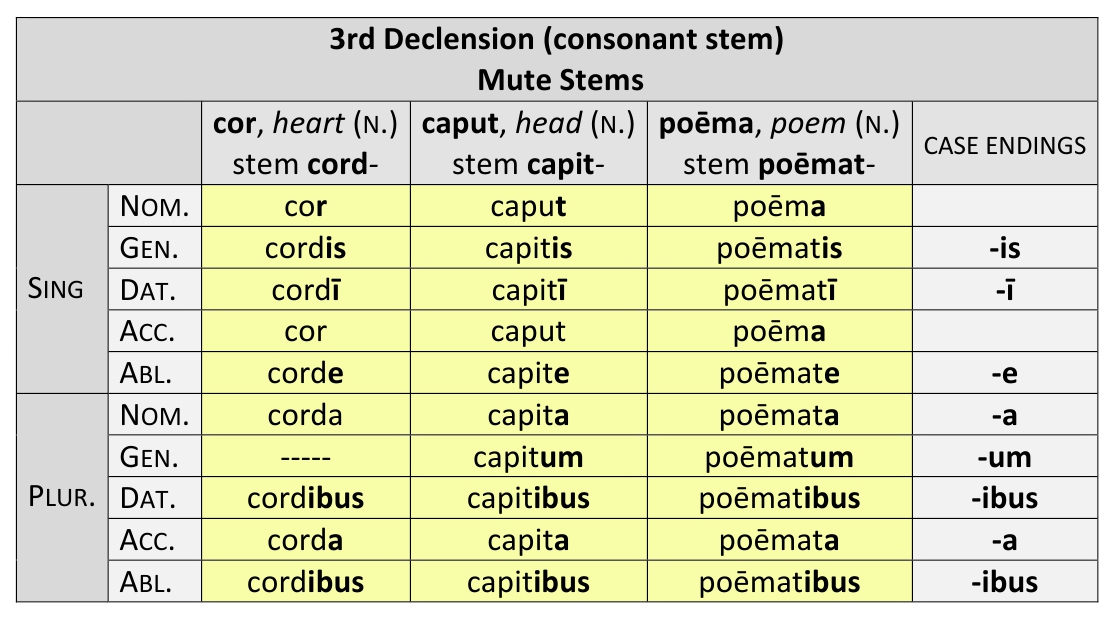
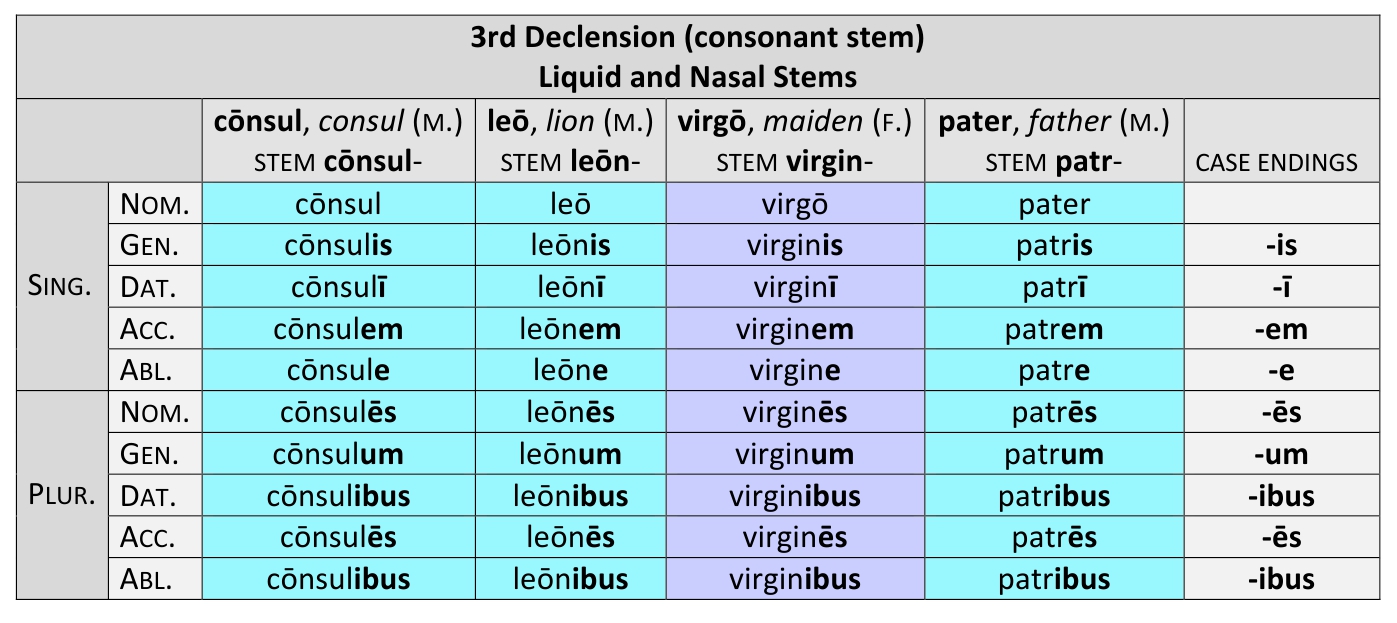
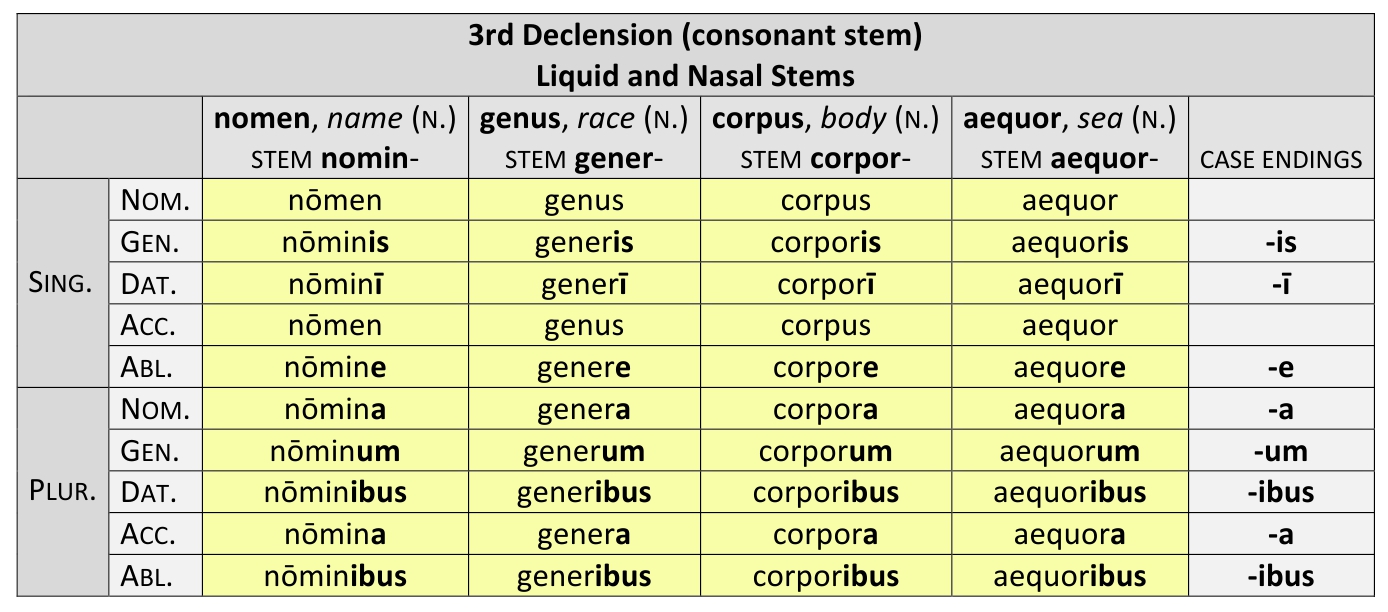

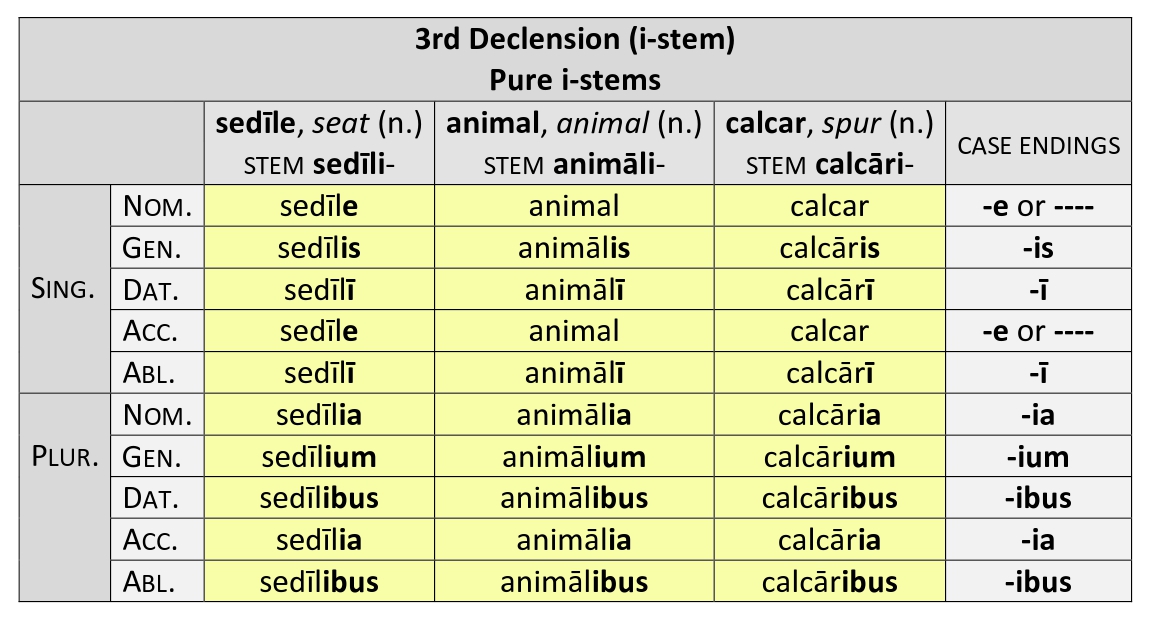

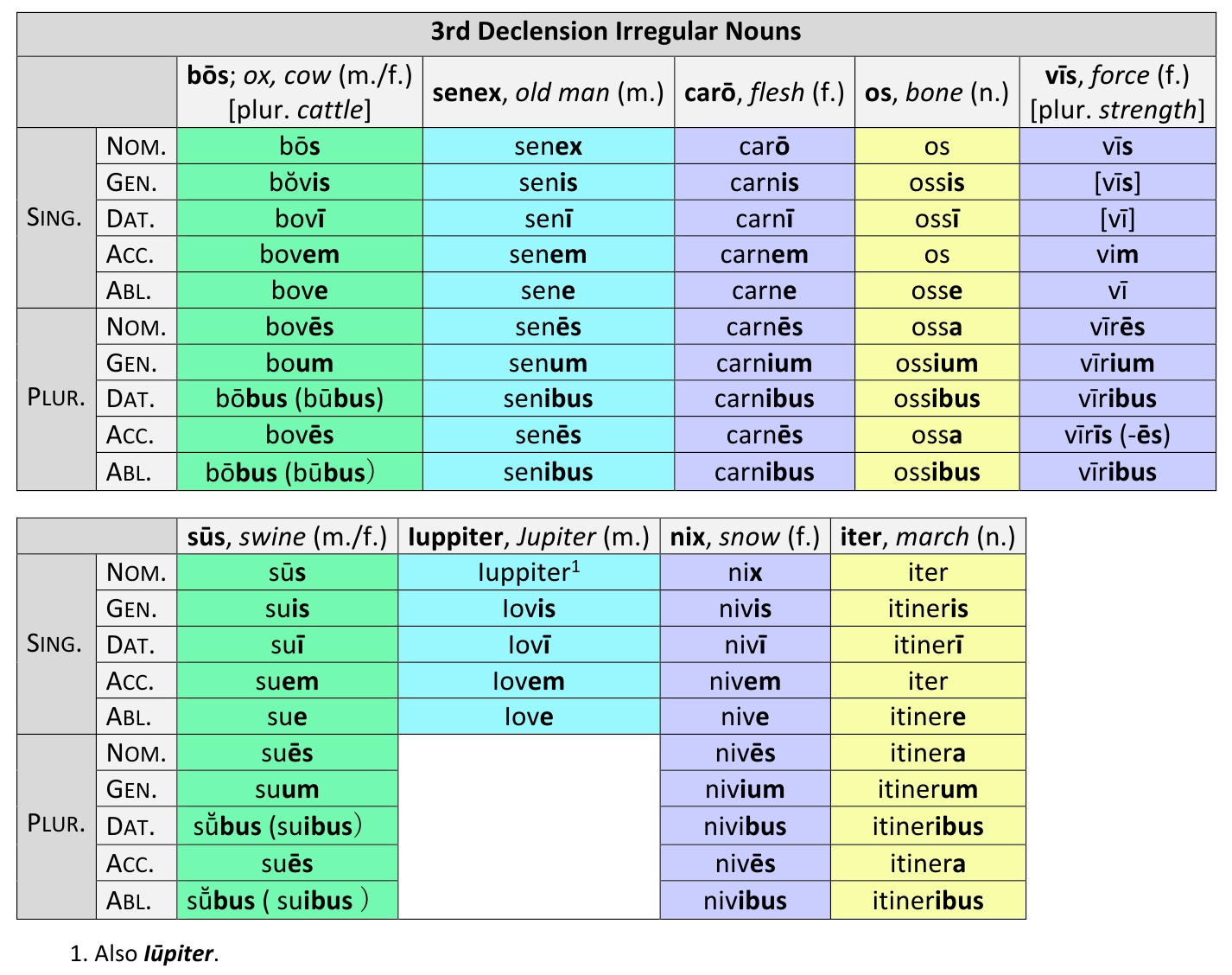
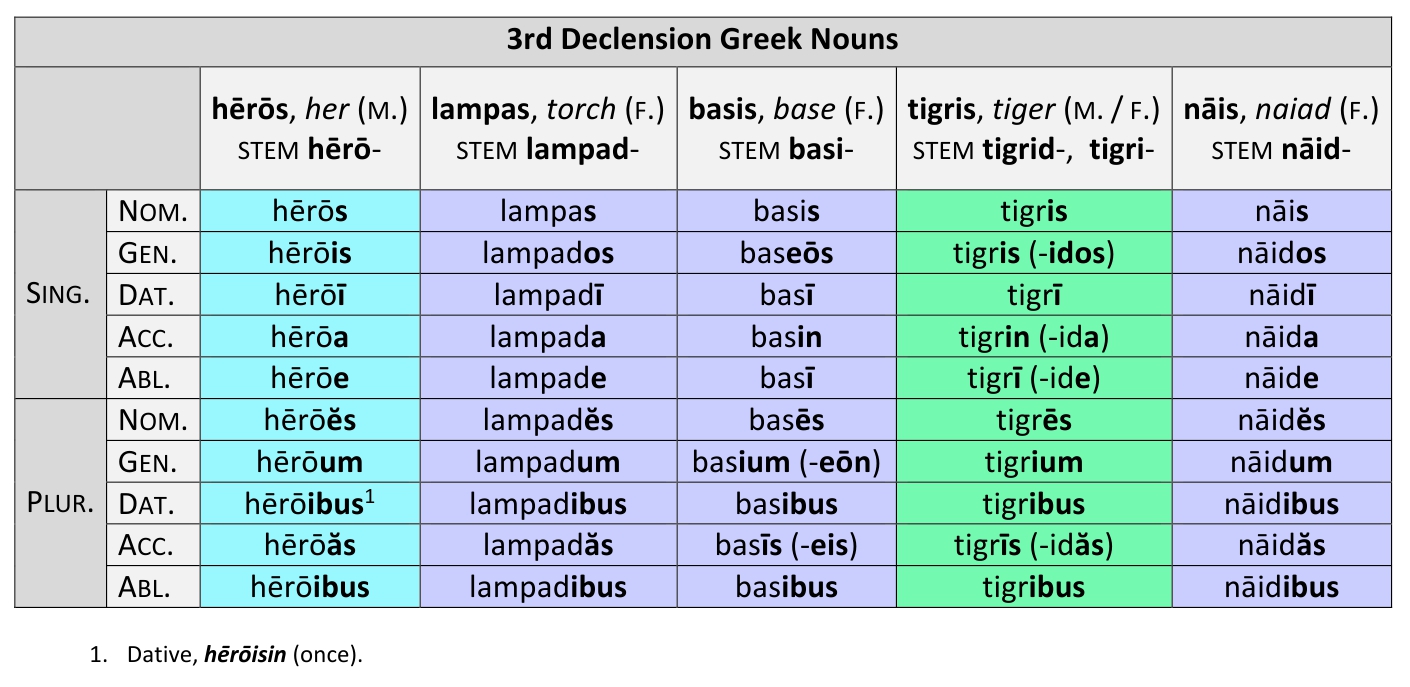

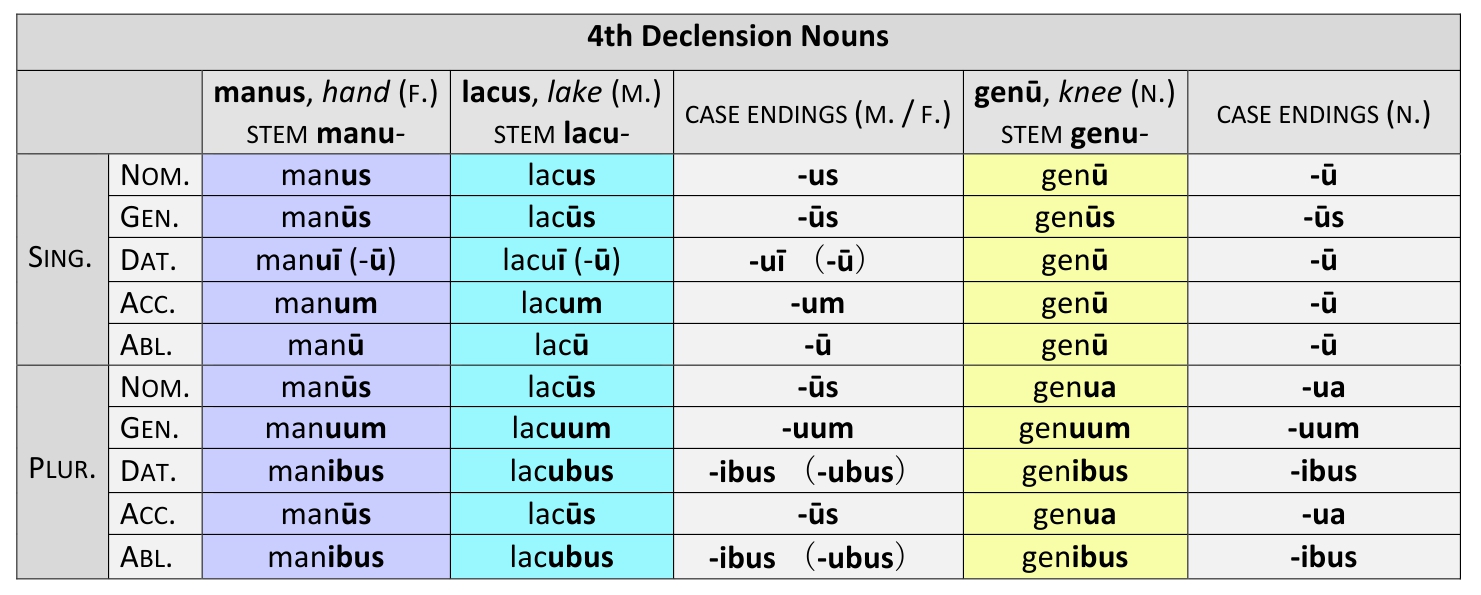
![Paradigm for 4th declension feminine noun Domus [house]](files/noun-declensions/4th_decl_domus_2.jpg)
